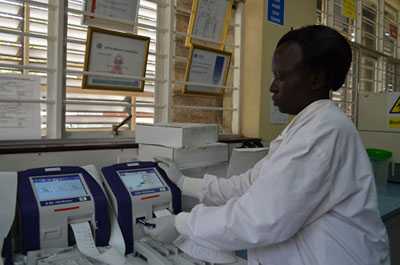Improving HIV Diagnosis and Linkage to Care: Point-of-Care Tests
While antiretroviral therapy is now more widely available in Kenya, expanding clinical and laboratory services and providing better linkage to care for those who test HIV positive is critical to ensuring that more people receive HIV care and treatment.
 To address this need, CDC is working with the Kenya Medical Research Institute (KEMRI) to conduct studies on the expansion of antiretroviral services by providing point-of-care testing of CD4 counts and HIV viral load, two important tests for managing the care of persons living with HIV. Together, they are also working on a point-of-care test for early infant diagnosis of HIV infection.
To address this need, CDC is working with the Kenya Medical Research Institute (KEMRI) to conduct studies on the expansion of antiretroviral services by providing point-of-care testing of CD4 counts and HIV viral load, two important tests for managing the care of persons living with HIV. Together, they are also working on a point-of-care test for early infant diagnosis of HIV infection.
Currently, many labs in Kenya do not have the capability of conducting regular viral load tests, requiring patients to return for laboratory results several days or weeks after they are tested. In rural areas of Kenya, travel to clinics and laboratories can be very difficult for patients. When test results are delayed, patients may not return to learn the test’s outcome and the opportunity to provide the best care is lost.
With point-of-care tests, results are ready on the same day, and sometimes within the hour. With results in hand, a patient can immediately be started on antiretroviral therapy or have their regimen adjusted. Particularly for a person recently diagnosed with HIV, linkage to care is important in establishing a relationship with the clinic and receiving the best support possible for managing their health. Study staff have completed initial validation of the CD4 point-of-care test to show that the test itself is accurate. They are currently working on validation of the point-of-care viral load and early infant diagnosis test. The study will then look at the impact that the tests have on linkage to care and patient management; this will be completed in 2014. The CD4 test is being evaluated as part of home-based HIV testing and counseling conducted in Nyanza region, while the viral load test impact evaluations will be conducted in local health facilities.
Related Links
Finally, conducted in the Siaya, Bondo, and Homa Bay areas of the Nyanza region the feasibility of implementing the tests at full scale is being studied to ensure that their use is sustainable. The results of the study are eagerly awaited to see whether point-of-care tests can be adopted into programs across Kenya and around the world.
Another significant challenge that remains for HIV programs is ensuring that babies born to HIV positive mothers are tested, receive a timely diagnosis and, if positive, treated. According to Kenya’s National AIDS & STI Control Programme (NASCOP), the average time to link a baby to care in Kenya is three years – a loss of valuable time during which many of these children die. Previously in the Nyanza region, only one laboratory was able to provide early infant diagnosis of HIV; it sometimes took months to get test results back. The point-of-care test for early infant diagnosis of HIV which is being studied now, if implemented, would provide a family their baby’s test result in one clinic visit and facilitate linking the infant to HIV care.
According to Dr. Clement Zeh, one of CDC’s HIV researchers from the Division of HIV/AIDS Prevention (DHAP) working in collaboration with KEMRI, “Doctors can make an immediate decision on how to care for and advise their patients.”
The studies have an even greater impact than improving linkage to care. CDC and KEMRI were host to one of the sites where a recent clinical trial study, HPTN052, showed that persons who are receiving antiretroviral treatment are less likely to transmit HIV to their partners. Since many people in Kenya who are HIV-infected are married or in stable relationships and have a partner who is not HIV-infected, ensuring that people who test positive receive timely and optimal care can reduce the risk of transmission of HIV to the non-infected partner.
Another CDC and KEMRI study demonstrated that pregnant and breastfeeding women who are on antiretroviral therapy are less likely to transmit HIV to their babies. Dr. Lisa Mills, the principal investigator of HPTN052 in Kenya noted, "Treatment is also very powerful prevention, so it’s a win-win. However, it requires that HIV-infected people know their status and get linked to effective treatment services. Point of care technologies have the potential to greatly improve the response to HIV in Kenya."
- Page last reviewed: January 2, 2015
- Page last updated: January 2, 2015
- Content source:
Global Health
Notice: Linking to a non-federal site does not constitute an endorsement by HHS, CDC or any of its employees of the sponsors or the information and products presented on the site.


 ShareCompartir
ShareCompartir